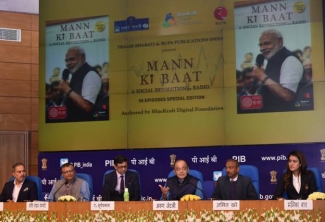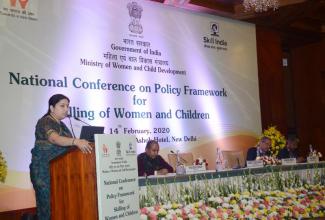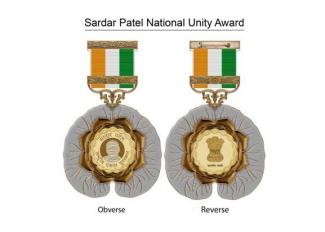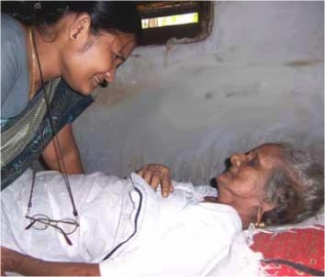
Union Minister of Finance & Corporate Affairs, Arun Jaitley, released a book titled ‘Mann Ki Baat – A Social Revolution on Radio’ on Saturday. The book is based on 50 episodes of Prime Minister Narendra Modi’s heart to heart talk with the citizens of India broadcast on All India Radio.
The book sheds light on various aspects of Prime Minister’s outreach, the remarkable response it continuously received from the people, the mass movement it has inspired and the profound impact it ingrained in the minds and hearts of the youth of India. The book also gives insight into behind the scene research work done on the massive public feedback received through various channels after every episode of Mann Ki Baat, which had aired first on 3rd October, 2014.
The book also gives a rare and exclusive opportunity to readers to discover several unknown facets of Prime Minister’s thinking and beliefs related to Mann Ki Baat, revealed by him to the authors of the book. The insights that emerge from the transcripts of the radio address are the most important contribution of this book.
Interesting anecdotes shared by the members of the Prime Minister’s core team and people from All India Radio and MyGov shed light over the minute but interesting details of how the idea of the radio programme came up, how the name and frequency were decided and how the format was chalked out, among other things.
The book has been collated by BlueKraft Digital Foundation, a not for profit organization, and brought out by Rupa Publication, India, a reputed publishing house.
Speaking on the occasion, Jaitley said that Mann Ki Baat program has a strong power of recall which leaves deep footprints in the minds of listeners of the program. He highlighted the power of radio, recalling its impact as a source of both news and entertainment, its huge geographical reach and as a mode of learning language. He added that radio was used extensively by Mahatma Gandhi during the freedom movement to reach out to people directly. Prime Minister Narendra Modi started using the medium of radio for governmental communication in order to establish direct communication with people by identifying its wide reach. He added that the program is a great example of crisp communication, stating that time for long winded statements is over.
“ मन की बात – रेडियो पर एक क्रांति ” पुस्तक का लोकार्पण
केन्द्रीय वित और कारपोरेट कार्य मंत्री अरूण जेटली ने आज नई दिल्ली के राष्ट्रीय मीडिया सेन्टर में आयोजित एक कार्यक्रम में ‘मन की बात – रेडियो पर एक सामाजिक परिवर्तन’ नामक पुस्तक का लोकार्पण किया। यह पुस्तक आकाशवाणी द्वारा प्रसारित प्रधानमंत्री श्री नरेन्द्र मोदी का दिल से दिल मिलाकर संवाद करने का कार्यक्रम ‘मन की बात’ की 50 कड़ियों पर आधारित है।
यह पुस्तक प्रधानमंत्री की पहुंच के विभिन्न पहलुओं , कार्यक्रम के बारे में लोगों से प्राप्त निरंतर प्रतिक्रियाओं , जन आंदोलन प्रारंभ करने में इसकी प्रेरणा, भारत के युवाओं के मष्तिक औऱ हदय पर पड़े गंभीर प्रभावों के बारे में प्रकाश डालती है। यह पुस्तक ‘मन की बात’ कार्यक्रम की प्रत्येक कड़ी के बाद विभिन्न चैनलों से मिले लोगो के फीड बैक पर पृष्ठभूमि में किये गये शोध कार्य की भी जानकारी देती है। ‘मन की बात’ का पहला प्रसारण 3 अक्टूबर 2014 को हुआ था।
यह पुस्तक पाठकों को प्रधानमंत्री की सोच औऱ मन की बात से जुड़े उनके विश्वासों के बारे में जानने का दुर्लभ औऱ विशेष अवसर प्रदान करती है जिसे प्रधानमंत्री ने लेखकों से प्रकट किया है। रेडियो संबोधन के ट्रांसक्रिप्ट से भीतरी बातें उजागर हुई हैं और पुस्तक में इन बातों का महत्वपूर्ण योगदान है।
इस पुस्तक में प्रधानमंत्री की महत्वपूर्ण टीम और आकाशवाणी के लोगों और माईगोव द्वारा साझा की गईं दिलचस्प बातें यह बताती हैं कि किस तरह रेडियो कार्यक्रम का विचार आया, कैसे नाम और फ्रिक्वेंसी का निर्णय हुआ और किस तरह रूपरेखा बनाई गई।
इस पुस्तक की क्रमवार सामग्री अ-लाभकारी संगठन ब्लू क्राफ्ट डिजिटल फाउंडेशन द्वारा एकत्रित की गई है और इसका प्रकाशन प्रतिष्ठित प्रकाशक रूपा पब्लिकेशन इंडिया द्वारा किया गया है।
इस अवसर पर जेटली ने कहा कि ‘मन की बात’ कायर्क्रम में ऐसी स्मरण शक्ति है जो कार्यक्रम के श्रोताओं पर गहरी छाप छोड़ती है। उन्होंने रेडियो की शक्ति, समाचार और मनोरंजन के प्रमुख स्रोत के रूप में इसके प्रभाव और इसकी विशाल भौगोलिक पहुंच का जिक्र किया। जेटली ने कहा कि महात्मा गांधी स्वतंत्रता आंदोलन के दौरान लोगों तक सीधे पहुंचने के लिए रेडियो का व्यापक उपयोग करते थे। प्रधानमंत्री मोदी ने रेडियो की व्यापक पहुंच को पहचानते हुए रेडियो माध्यम का उपयोग शुरू किया ताकि सीधे तौर पर लोगों से संवाद किया जा सके। उन्होनें कहा कि यह कार्यक्रम स्पष्ट संवाद का बड़ा उदाहरण है और अब बड़े वक्तव्य का समय नहीं रह गया है।










